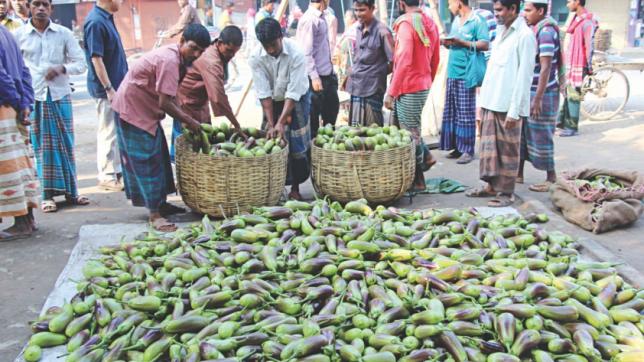Pesticide use falls but risks remain

The cultivation of Bt brinjal has enabled farmers to reduce pesticide use and log higher profits but the genetically modified vegetable is not fully free from the risk of fruit and shoot borer (FSB) infestation, a new study found.
The FSB is one of the most devastating pests that damages up to a third of the conventional crop.
The findings of the study on the impact of Bt brinjal, jointly carried out by International Food Policy Research Institute (IFPRI) and the government of Bangladesh, were released at a programme at InterContinental Hotel Dhaka yesterday.
In 2013, the government introduced the genetically modified (GM) brinjal, dubbed as resistant to the pest.
The study, conducted on 1,200 farmers, including 600 growers of Bt brinjal, finds that the infestation of the FSB and other pests were lower in the plots producing the GM eggplant compared to those growing regular brinjal.
Some 90 percent of the Bt brinjal plots were free from the attack of the FSB and the rest 10 percent was affected by the pest, it said.
The GM vegetable is not resistant to other insects: infestation of pests such as leaf eating beetles was 47 percent while it was 49 percent in case of infestation of pests such as thrips, white fly and aphids.
Because of the lower infestation, Bt brinjal farmers can reduce the number of applications and the amount of pesticide sprayed.
“We have found a significant impact. The FSB infestation was almost eliminated among Bt brinjal plants,” said Akhter Ahmed, country representative of the IFPRI, while presenting the findings.
The production cost also declined as Bt brinjal farmers enjoyed a 55 percent increase in revenue, boosting net profits by Tk 30,000 per hectare, he said.
The study, which was carried out between November 2017 and July 2018 in Bogura, Gaibandha, Naogaon and Rangpur, finds that the yield of Bt brinjal was 2.9 times higher at Tk 17.35 tonnes per hectare than the national average of 5.97 tonnes.
Farmers sprayed 10-15 times on the GM crop whereas the number of spray on non-GM was 16-25, said Kazi Md Shaiful Islam, additional director of the Department of Agricultural Extension (DAE), while presenting another paper.
The study on the impact of the much-talked about Bt brinjal came nearly six years after the government, despite opposition from anti-GM activists, released the first GM crop with the objective to reduce the use of harmful pesticides to grow the eggplant, one of the widely consumed vegetables in the country.
At the inaugural ceremony, Agriculture Minister Muhammad Abdur Razzaque said there was opposition to GM but “we don't find anything wrong with Bt brinjal”.
“To address future challenges in agriculture, we have to do research in biotechnology and other areas,” he said.
Wais Kabir, executive director of Krishi Gobeshona Foundation, said Bt brinjal was an example of safer crops owing to the reduced use of pesticide.
He added that the country needs to conserve biological diversity and should be careful while cultivating GM crops.
The GM seeds should be clearly earmarked and a border crop should be grown surrounding the GM one, he said.
The DAE's Islam said a tag on bio-safety was supposed to be used on Bt brinjal. But it is not being used, creating a scope for it to be mixed with non-Bt brinjal.
Anwar Faruque, a former director general of the seed wing of the agriculture ministry, said there was a precondition for selling Bt brinjal with labels.
ASM Mahbubur Rahman Khan, a former chief scientific officer of Bangladesh Agricultural Research Institute, said 1-2 percent of Bt brinjal could be affected by the FSB.
“A border crop is a must to cultivate Bt brinjal. Otherwise, it will be problematic if resistance grows,” he said.
Imran Matin, executive director of the Brac Institute of Governance and Development, said rigorous research would be necessary in keeping with the expansion of GM crops.
He stressed on governance, strong regulatory institutions and citizen's engagement in the farming of GM crops.
Nazneen Ahmed, senior research fellow of the Bangladesh Institute of Development Studies; Md Nasiruzzaman, agriculture secretary, and Zeinah Salahi, acting mission director of the USAID, also spoke.
